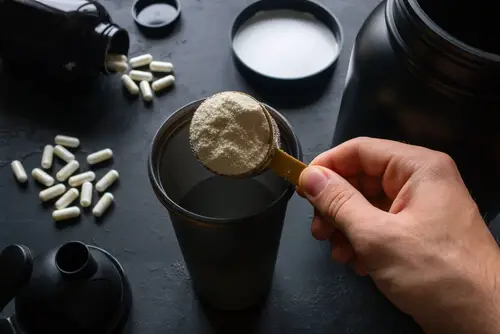Whether you are a runner, triathlete, bodybuilder, or love taking group fitness classes, it’s hard not to become overwhelmed with the endless powders and supplements that line the shelves of every health store.
Fitness enthusiasts are bombarded with a wide assortment of different types of pre and post-workout concoctions; all marketed to help build muscle, improve muscle repair, reduce muscle loss, improve energy, improve performance and enhance stamina. And I could go on with their claims.
According to Statista.com, the global sports nutrition market and supplement market was valued at 13.9 billion U.S. dollars in 2018 and is expected to increase in value to 35.35 billion U.S. dollars by 2025.
That is insane. Insane because the vast majority of supplements are unneeded with a proper diet. Many contain poor-quality ingredients. Sports supplements are unregulated so just about anyone can claim their supplement is a miracle supplement and put anything they want in it.
But not all supplements are bad.
You have probably heard of them, seen someone sipping on them, or have maybe even tried them yourself, but do BCAAs offer any actual benefits to runners, or are they just another costly gimmick?
- What are BCAAs?
- List of amino acids and food source
- What are the benefits of BCAAs?
- Frequently asked questions about BCAAs (FAQ)
- Should runners take BCAAs?
- Can BCAAs help you run faster?
- Can BCAAs help prevent muscle fatigue during my run?
- Can BCAAs help you recover faster after a run and prevent muscle soreness?
- Can BCAAs help with improving endurance?
- Can BCAAs help with preventing muscle breakdown?
- What foods contain BCAAs and essential amino acids?
- What are the side effects of using BCAAs?
- Should you take BCAAs before, during, or after a run?
- Are all BCAAs created equal?
- Do BCAAs help with mental fatigue?
- What dose of BCAAs is right for me?
- Summary
What are BCAAs?
BCAAs stands for branched-chain amino acids. These amino acids are leucine, isoleucine, and valine.
There are twenty different types of amino acids required for our bodies to function correctly. They are the building blocks of protein and help our bodies produce muscle, absorb vitamins and minerals from the foods we eat, reduce fatigue, and repair damaged tissue.
Essential vs. non-essential amino acids
Of the twenty different types of amino acids, some are considered essential while some are deemed non-essential.
Nine of these twenty are essential which means that we can only obtain them through the foods that we eat.
The rest are non-essential and are called that because they can be produced naturally by our bodies.
Within the nine essential amino acids, there are three specific types known as branched-chain amino acids (BCAAs) and they are considered to have the most significant impact on our body’s ability to repair and grow muscle. They are leucine, isoleucine, and valine.
Each one of these amino acids has a specific role to play in the body:
Leucine
Leucine – This amino acid helps enhance protein synthesis, generates new muscle growth, and helps to repair damaged muscles. It also plays a role in regulating insulin and managing blood glucose levels.
Isoleucine
Isoleucine – Isoleucine plays a vital role in regulating how the body utilizes glucose, storing it in muscle cells instead of fat cells.
Valine
Valine – Valine helps prevent muscles from breaking down after an intense workout and provides mental stimulation as well as helps prevent mental fatigue. It also helps enhance muscle endurance.
List of amino acids and food source

What are the benefits of BCAAs?
Studies have been ongoing about the benefits that supplementing with BCAAs can provide, and so far, the results have been promising, albeit mixed at times. Especially for runners.
It appears that for those living an active lifestyle, especially those who do lots of strength training or high-intensity training, BCAAs can offer a wide range of different benefits, both in terms of athletic performance and overall health.
Some of the most significant benefits that BCAAs can provide include:
Increased muscle growth
When taken in conjunction with a proper fitness and nutrition plan, BCAAs have been shown to improve muscle protein synthesis and increase muscle growth and development.
Faster recovery time
Delayed onset muscle soreness (also known as DOMS) occurs between 24 and 48 hours after a strenuous workout. Since BCAAs help improve muscle function, supplementing with these aminos can help reduce the severity and duration of the DOMS experienced.
Less muscle damage
During an intense workout, your muscles break down and experience tiny tears. Supplementing with BCAAs help promote faster and more efficient healing of these tears, causing less damage to your muscles. BCAAs have shown that it reduces protein breakdown assisting in muscle protein usage.
Enhanced immunity
As I mentioned earlier, amino acids play a role in how nutrients are shuttled through the body and into our cells. Ensuring that we are consuming the proper amount of BCAAs can positively affect how well we utilize the nutrition that we take in, therefore bolstering our immunity and enhancing our overall health.
Increased weight loss
Studies have shown that BCAAs can help boost metabolism and enhance fat loss in those that are following a proper exercise and fitness routine. These amino acids help preserve lean muscle mass and improve muscle growth, which increases the body’s ability to burn excess fat.
If you follow an intermittent fasting eating style or low carbohydrate diet, you may be worried about the loss of lean muscle mass due to caloric restriction. BCAAs may help preserve more lean muscle mass, although research has not shown that intermittent fasting causes the loss of lean muscle mass. In fact, intermittent fasting may have a lot of benefits for runners.
Reduced fatigue
BCAAs can help provide fuel to the body’s muscles, even in situations where the body is completely depleted of its glycogen stores. Supplementing with aminos can help increase endurance and performance ability during a workout and can boost energy levels even after training is complete.
But this is for the athletes who strength train. What about runners and other endurance athletes?
Frequently asked questions about BCAAs (FAQ)
Should runners take BCAAs?
As runners, we are all looking for ways to improve our performance. While we know that there is no special pill, powder, or potion that will work miracles for us, there are some natural supplements available on the market that can help.
Certain products can help boost speed, increase endurance, and aid in recovery but are BCAAs one of them?
If so, are the benefits that they offer significant enough to make a difference to your running regimen?
Let’s take a deep dive into the world of BCAAs and find out what, if anything, they can do for you as a runner.
Can BCAAs help you run faster?
The answer to this question is two-sided: yes and no. To clarify, in the short term, taking BCAAs before or during your run will not make you run any faster than you did the day before. However, long-term use of BCAAs can help you improve muscle mass, which as a result can make you stronger and therefore may improve your running speed in the long run.
Can BCAAs help prevent muscle fatigue during my run?
Yes! Numerous studies have been performed on the efficacy of BCAA supplementation helping with muscle fatigue during physical activity. The consensus of these studies is that muscle fatigue can be significantly reduced with the use of BCAAs. These amino acids provide fuel and nutrients to the muscles, giving them the extra energy required to power through a run.
Can BCAAs help you recover faster after a run and prevent muscle soreness?
One of the most promising benefits of BCAAs is their unique ability to help with faster recovery after an intense run or workout. However, intensity is the key! Low-intensity exercise, not so much.
BCAAs, specifically leucine, help decrease the severity of muscle breakdown and promote faster healing of damaged muscle tissue.
This increased muscle preservation reduces the effects of delayed onset muscle soreness (DOMS) and gets you ready for another run faster than those who don’t supplement with BCAAs.
Can BCAAs help with improving endurance?
BCAAs have become increasingly popular with endurance athletes, and for a good reason. When the body begins running out of glucose, BCAAs can act as a fuel source for the muscles. This provides extra energy and can help you push out longer runs, providing increased stamina. However, carbohydrates should be your go-to fuel source as BCAAs alone are not sufficient. They may help, but marginally.
Can BCAAs help with preventing muscle breakdown?
The combination of leucine and valine plays a significant role in helping to reduce the severity of muscle deterioration after an intense run. When we exercise, the body must receive an adequate amount of amino acids to help provide it with the fuel it needs. If there aren’t enough BCAAs in the bloodstream, the body may start to catabolize or break down muscle tissue. Again, proper fueling with carbohydrates will prevent this from happening.
What foods contain BCAAs and essential amino acids?
Since our bodies do not produce essential amino acids, we must obtain them through either supplementation or through the foods that we eat.
Eating a well-balanced, wholesome diet that contains a wide variety of different foods should provide you with a healthy supply of essential amino acids, sufficient for getting you through your regular daily activities.
In most cases, a proper diet of whole foods will give you what you need without the need to supplement with a BCAA product.
High levels of leucine can be found in beef, lamb, poultry, cheese, moringa, peanuts, brown rice, corn, and quinoa.
Significant isoleucine is present in beef, yogurt, certain fish, moringa, sunflower seeds, seaweed, oats, and lentils.
Valine can be found in most meat and dairy products, some mushrooms, moringa, peanuts, and soy.
As you can see, a few food items are BCAA superstars.
Since animals use essential amino acids in their own muscle growth and development, most animal products such as meat and dairy items are an excellent source of BCAAs.
Certain plants, fruits, and vegetables are also excellent sources of these aminos. Moringa is a plant grown in tropical regions whose leaves can either be eaten or consumed as a supplement. It is packed full of vitamins, minerals, and essential amino acids.
Even though BCAAs can be found in abundance in many of the foods that we eat, as an athlete, it can be challenging to obtain the levels we require from diet alone IF we are pushing our bodies hard and not eating properly. In this case, BCAA supplements may be helpful.
Most health food and nutrition stores carry BCAA supplements in either a pill form or as a powder that can be mixed with water.
What are the side effects of using BCAAs?
Because branch chain amino acids are essential for our health, are necessary for quite a few vital functions that our body performs, and are found in many of the foods we eat, they are generally considered safe to supplement with.
Gastrointestinal issues
When consuming in excess or taking BCAAs for an extended period of time, some people may experience intestinal issues like nausea, vomiting, diarrhea, or bloating.
Other people have experienced muscle pain or cramping, and headaches. The incidence of any of these side effects, however, is extremely rare.
Blood glucose regulation during surgery
Some studies have shown that supplementing with BCAAs immediately before or after surgery may have some complications when it comes to blood glucose regulation. Therefore, they should be avoided if you have surgery scheduled in the near future and should only be added back to your diet once you fully recover.
Speak to a dietitian or healthcare professional
Before taking any new supplement, it is always advisable to speak with your dietitian, doctor, pharmacist, or healthcare provider to make sure that it is right for you. Ensure that you fully disclose all of the other medications you are currently taking to avoid drug interactions or unnecessary side effects.
BCAAs supplements are not recommended for women who are pregnant or nursing.
Should you take BCAAs before, during, or after a run?
There is considerable debate as to when to take your BCAAs. If you are taking a pill form of BCAAs and haven’t consumed any other vitamins or supplements in the past two hours, taking them before a run will help give you the extra energy and mental clarity that you need to push through your workout. However, drinking BCAAs before a run may leave you feeling sluggish and water-logged.
During runs, I would focus on water or sports drink over BCAAs because your focus during the run is hydration and for longer runs, electrolyte replacement, and carbohydrate replacement. BCAAs have very little to no effect while running.
Drinking BCAAs immediately after a run will ensure that your muscles receive the branched-chain amino protein they need to help repair themselves and recover properly; however, a better choice is protein or protein shakes as they contain a more complete protein recovery.
Are all BCAAs created equal?
BCAAs are available in pill form and powder form and can be made from either animal or plant sources, so which is the best for you?
The main benefit of taking a BCAA supplement in tablet form is that it can be consumed quickly and easily. If you don’t have time to sip through a bottle of BCAAs or you prefer to pop a pill, then this type of BCAAs may be the right choice for you.
Mixing a powdered form of BCAAs into a bottle of water or adding it to a shake or smoothie has its own benefits. Not only will this ensure that you are drinking your daily water requirements and staying hydrated, but powdered BCAAs are also absorbed more efficiently, allowing them to be better utilized by the body.
If the taste is an issue, powdered BCAAs are available in a wide variety of different flavors and even come in unflavored versions. Powders are also usually cheaper than the pill form and don’t contain as many additives and fillers.
BCAAs can be made from either animal or plant sources. Both of these will provide the same results from a health and nutritional standpoint; the choice is yours, based on your ethics and personal beliefs. If you prefer a plant-sourced BCAA supplement, look for one that is labeled “Vegan.”
Do BCAAs help with mental fatigue?
Mental fatigue during a workout can be just as detrimental as physical exhaustion. As you exercise, your body produces another amino acid called tryptophan. When tryptophan reaches the brain, it is used to help produce the hormone serotonin.
This hormone is linked to feelings of fatigue, and too much serotonin production can cause you to get sleepy during a run.
Supplementing with BCAAs, especially the amino acid valine, counteracts this effect and actually produces the opposite reaction, giving you more energy and an increased level of mental alertness.
Other fuel sources, like many GUs and gels, use caffeine to counteract this same mental fatigue.
What dose of BCAAs is right for me?
BCAAs are most commonly found in three different ratio dosages; 2:1:1, 3:1:2, and 8:1:1. These are the ratios of leucine to isoleucine and valine.
The most widely found ratio is the 2:1:1 formation and should provide you with an appropriate amount of all three branch chain amino acids to meet your needs as a runner.
Many people who are looking for a significant increase in muscle mass, such as bodybuilders, opt for a higher ratio of leucine which has been shown to promote muscle growth.
Summary
BCAA supplementation has a bigger impact when used with higher intensity training, strength training, or bodybuilding sports.
For runners, the majority of your runs are easy-paced and this makes the need for BCAA supplementation questionable. It may benefit some people to reduce muscle soreness or shoot energy boost, but generally speaking, it is not necessary or that helpful. In many cases, what you are feeling may be the placebo effect.
The research is varied and targets mostly bodybuilders and high-intensity sports athletes. It just isn’t there to strongly point in one way or another as to whether it helps runners much.
- About the Author
- Latest Posts

Steve Carmichael is a running coach, sports performance coach, nutrition coach and has been a recreational runner for over 18 years. Steve holds multiple certifications as a certified running coach through the RRCA and USA Track and Field as well as he is a NASM certified personal trainer, and PN1-L1 certified nutrition coach.
Steve has been coaching since 2010 and has helped thousands of runners online and in the Central Ohio area maximize performance and run injury-free.
Steve is the founder of RunBuzz and Run For Performance.com. If you are interested in working with Steve though his online running and strength coaching services, feel free to reach out.


